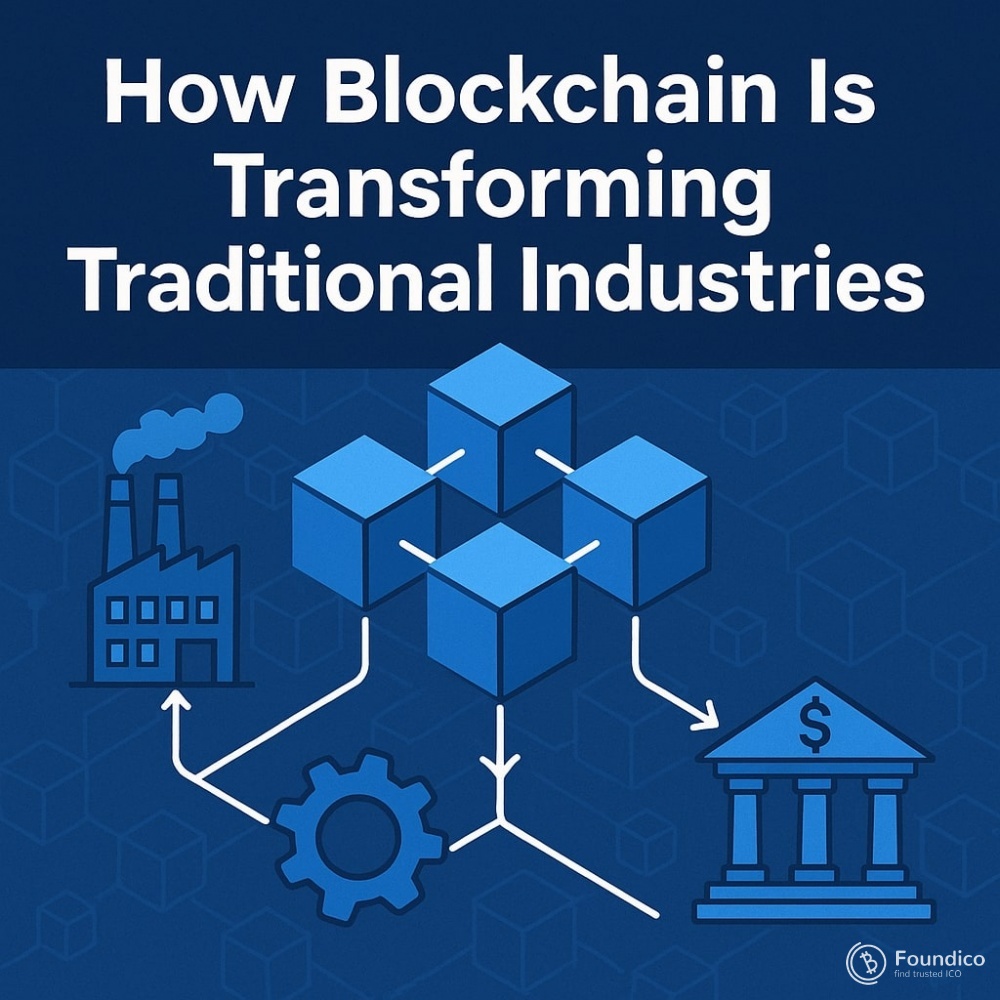How Blockchain Is Transforming Traditional Industries

By Dr. Pooyan Ghamari, Swiss Economist and Visionary
Blockchain technology, originally conceptualized as the backbone for Bitcoin, has evolved far beyond its initial application as a ledger for cryptocurrencies. Today, it is heralded as a revolutionary technology with the potential to disrupt and transform traditional industries worldwide. By enabling decentralized, transparent, and secure data management, blockchain is reimagining how businesses operate, collaborate, and deliver value.
As a Swiss economist deeply engaged in the study of technological innovation and economic transformation, I have observed firsthand how blockchain is reshaping sectors that have long been resistant to change. This article explores the profound impact blockchain is having on traditional industries, highlighting key use cases and future prospects.
The Core Advantages of Blockchain for Traditional Industries
Blockchain’s transformative power lies in its unique attributes:
-
Decentralization: Eliminates the need for intermediaries by allowing multiple parties to transact directly and securely.
-
Transparency: Every transaction is recorded on an immutable ledger visible to authorized participants, reducing fraud and increasing trust.
-
Security: Cryptographic principles safeguard data integrity and prevent unauthorized tampering.
-
Efficiency: Automates processes through smart contracts, reducing manual interventions and operational costs.
-
Traceability: Enhances the ability to track goods, services, and data provenance throughout complex supply chains.
These characteristics address many inefficiencies and vulnerabilities inherent in legacy systems.
Industry-Specific Transformations
1. Supply Chain and Logistics
Supply chains, traditionally opaque and fragmented, are prime candidates for blockchain innovation.
-
Blockchain enables end-to-end visibility of product journeys—from raw material sourcing to final delivery.
-
Companies like IBM and Maersk are pioneering blockchain platforms to streamline customs clearance, reduce paperwork, and combat counterfeit goods.
-
Enhanced traceability improves food safety, ethical sourcing, and regulatory compliance.
This transparency fosters greater consumer trust and operational agility.
2. Financial Services
The financial sector was blockchain’s original playground, and its influence continues to expand.
-
Blockchain facilitates faster cross-border payments, reducing settlement times from days to minutes.
-
Decentralized Finance (DeFi) platforms offer alternatives to traditional lending, insurance, and asset management, increasing access and lowering costs.
-
Tokenization of assets allows fractional ownership of real estate, art, and securities, broadening investment opportunities.
Financial institutions are adopting blockchain to improve efficiency and compete with fintech disruptors.
3. Healthcare
Healthcare systems benefit from blockchain’s ability to securely manage sensitive data.
-
Patient records can be stored on blockchain to ensure privacy, interoperability, and data integrity.
-
Supply chain tracking for pharmaceuticals reduces risks of counterfeit drugs entering the market.
-
Blockchain supports clinical trial transparency and streamlined insurance claims processing.
These advances enhance patient outcomes and operational efficiency.
4. Real Estate
Real estate transactions are often slow, expensive, and opaque.
-
Blockchain can digitize property titles and automate contract execution via smart contracts, reducing fraud and administrative delays.
-
Tokenization enables fractional ownership and liquidity in previously illiquid assets.
-
Transparent land registries can prevent disputes and corruption in property transfers.
Blockchain fosters a more accessible and trustworthy real estate market.
5. Manufacturing and Industry 4.0
Manufacturing embraces blockchain as part of the Industry 4.0 revolution.
-
Smart factories utilize blockchain for secure machine-to-machine communication and process validation.
-
Quality assurance and certification can be embedded in the blockchain, ensuring compliance.
-
Decentralized data sharing accelerates innovation across global production networks.
This integration drives productivity and resilience in manufacturing ecosystems.
6. Energy and Utilities
The energy sector is adopting blockchain to decentralize power generation and distribution.
-
Peer-to-peer energy trading platforms enable consumers to buy and sell renewable energy directly.
-
Blockchain enhances grid management through real-time data sharing and transparent billing.
-
Carbon credit markets leverage blockchain to improve verification and trading efficiency.
These developments support the transition to sustainable energy systems.
Challenges and the Road Ahead
Despite its promise, blockchain adoption faces obstacles:
-
Scalability: Current blockchain networks struggle to handle high transaction volumes efficiently.
-
Regulatory Uncertainty: Governments are still developing legal frameworks that balance innovation with consumer protection.
-
Integration Complexity: Legacy systems and organizational resistance pose implementation challenges.
-
Energy Consumption: Some consensus mechanisms consume significant power, prompting a shift to greener alternatives.
However, ongoing technological advancements—such as Layer 2 solutions, Proof of Stake consensus, and interoperable blockchains—are addressing these issues.
Blockchain is no longer just a theoretical concept or a cryptocurrency gimmick; it is a powerful tool that is actively transforming traditional industries across the globe. From supply chains to healthcare, finance to energy, blockchain’s decentralized, transparent, and secure architecture enables new business models, greater efficiency, and enhanced trust.
As a Swiss economist observing these shifts, I believe that organizations embracing blockchain innovation will gain a competitive advantage in the digital economy. Those who invest in understanding and integrating blockchain technologies today are positioning themselves at the forefront of tomorrow’s industrial revolution.
Dr. Pooyan Ghamari is a Swiss economist and visionary specializing in technological innovation and economic transformation. He advises governments and enterprises on blockchain adoption strategies and the future of digital finance.

 Harry The Hippo - Moo Shot is a crypto project inspired by Hacienda Napolis hippos, featuring $MOOSHOT as its utility token for staking, trading, and rewards in gaming and beyond.
Harry The Hippo - Moo Shot is a crypto project inspired by Hacienda Napolis hippos, featuring $MOOSHOT as its utility token for staking, trading, and rewards in gaming and beyond.